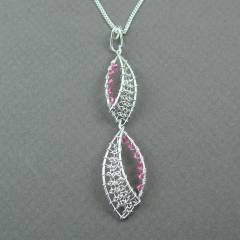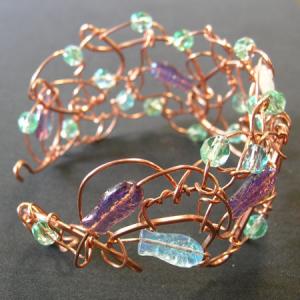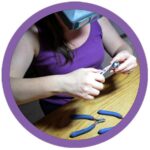Just received word that Marquise Series: Pendant 5 has been published in a German language book on nalbinding! The book, by Ulricke Claßen-Büttner, focuses mainly on the historical textile applications of the craft, but when she contacted me several months ago about including this piece, of course I said yes!
The book, Nadelbinden – Was ist denn das?: Geschichte und Technik einer fast vergessenen Handarbeit, is available from Amazon.de:
Nadelbinden – eine Jahrtausende alte Technik. Das Nadelbinden war und ist weltweit verbreitet und doch in Europa heute so gut wie unbekannt. Das war nicht immer so. Erst als sich im Mittelalter das Stricken ausbreitete, geriet das Nadelbinden in Vergessenheit. Heute entdecken kreative Menschen das Nadelbinden neu. Dieses Buch bietet dem historisch interessierten Leser einen Überblick über die Geschichte des Nadelbindens anhand wichtiger archäologischer Fundstücke. Für den Textilfachmann werden die vielfältigen Bindungsarten beschrieben und erläutert. Für all jene, die den Mut haben eine uralte Handarbeitstechnik neu zu erlernen und wieder zu beleben, gibt es Anleitungen zu verschiedenen Nadelbinde-Stichen und konkreten Projekten.
(English translation:
Nalbinding – a millennia-old Technique. Nalbinding was and is practiced worldwide and yet in Europe it is all but unknown today. That was not always so. Only after the Middle Ages when knitting became widespread, was nalbinding forgotten. Today creative people are rediscovering nalbinding. This book offers the reader an overview of the history of nalbinding based on important archaeological finds. For the textile expert, the various types of bindings are described and explained. For those who have the courage to try their hand at relearning and reviving this ancient technique, there are instructions on different stitches and nalbinding-specific projects.)
Ulrike Classen-Buettner is an archaeologist, a freelance textile artist, museum educator and author. She lives with her husband and child in Altmühltal in Bavaria. After training as a pharmaceutical-technical assistant at the PTA School and three years of working in a pharmacy, she decided in 1998, to pursue her dream of archaeological study.
She studied Prehistory and Early History, Geology / Paleontology, Provincial Roman Archaeology and Ethnology in Cologne and graduating with a master’s degree. During her studies, she was fascinated by the complexity of archaeological textile finds. She wanted to explore the basis of archaeological discoveries in the field of textile techniques, knowledge which could only be truly gained through practical, hands-on experience.
Since 2003 she has focussed on applying the historical manufacturing processes of textiles through her work as an artist and museum educator, and hopes to continue the revival of this ancient knowledge.




